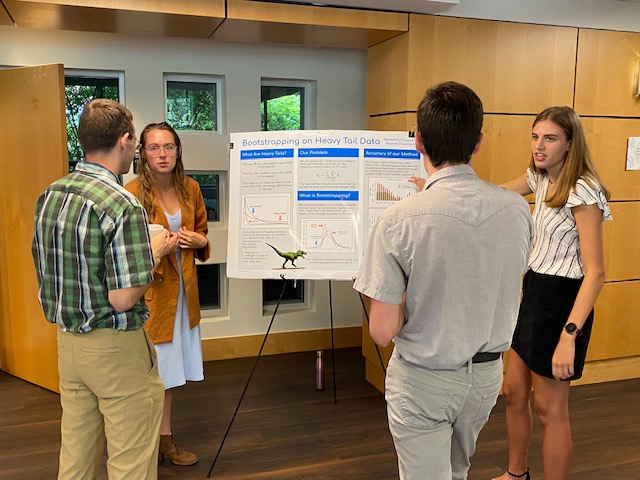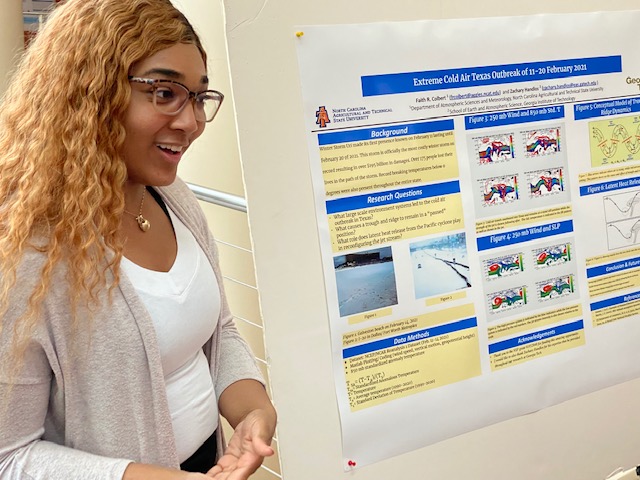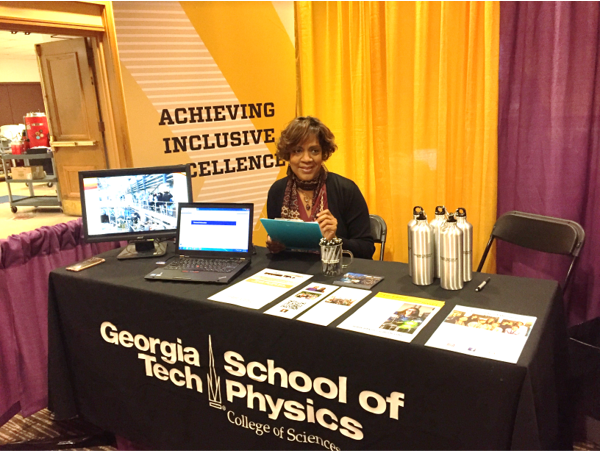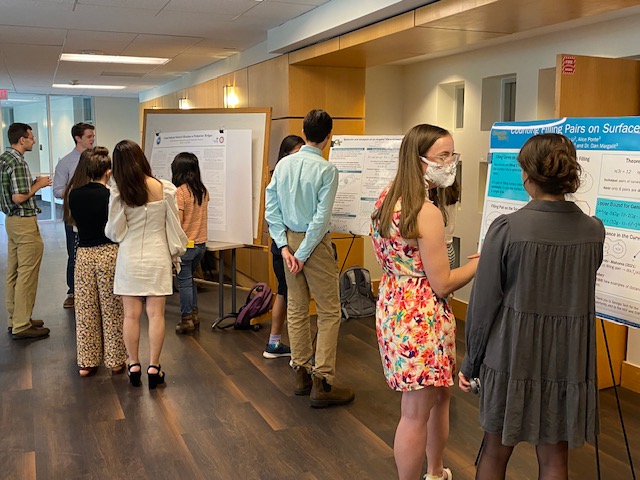
Aug 20, 2021
Please note that these interviews were conducted, and photos were taken, during the summer semester prior to Institute Operations Updates published August 2, 2021 in preparation for fall semester, which include: “To lower the risk for you and others, you are encouraged to wear a mask in indoor public places, including campus buildings, as recommended by the Centers for Disease Control and Prevention (CDC).”
Faith Colbert, a rising senior at North Carolina Agricultural and Technical State University, was born in Dallas, Texas. When her home state experienced a dangerous, deep cold spell in February of this year, the atmospheric sciences and meteorology major figured the best way she could help her family would be to study that catastrophic weather event.
A National Science Foundation Research Experiences for Undergraduates (NSF REU) program at Georgia Tech that she had enrolled in for summer 2021 gave her that chance. More students will soon have a similar opportunity; starting in summer 2022, for the first time, all six College of Sciences schools will offer an REU.
“My motivation was mainly driven by emotional pulls,” Colbert says. “My family being directly affected by the storm pushed me to find research-based answers for both them and me.”
The REU that enabled her to conduct that research was the Aquatic Chemical Ecology at Georgia Tech summer research program, an interdisciplinary REU with the Schools of Earth and Atmospheric Sciences (EAS), Biological Sciences, and Chemistry and Biochemistry. EAS also has its own REU: Georgia Tech Broadening Participation in Atmospheric Science, Oceanography, and Geosciences research program.
Sara Cuevas-Quiñones, a second year student at Purdue University, attended both of those REUs this summer. She’s a physics major but had a chance to explore planetary sciences with her research project on potential volcanic activity near Mars’ Jezero Crater, where NASA’s Perseverance Rover is currently exploring.
“I’ve never had research experiences before,” Cuevas-Quiñones says. “It's been a great environment, great people. It's been wonderful working with all my peers, and just learning about them, seeing where they come from, what they're researching. Many people here are in totally different fields. That's also been interesting, to get exposed to these new things that I had no idea even existed, honestly.”
Georgia Tech’s REUs give Cuevas-Quiñones and other students — particularly those from underrepresented communities and those who are enrolled at universities without research opportunities found at Tech — a chance to get in the lab, or out in the field. The experiences also give students from smaller colleges and universities the opportunity to use state-of-the-art equipment, and to be mentored by top Georgia Tech researchers.
That was the situation for Meredith Clayton, who is set to graduate this December from Stephen F. Austin State University (enrollment: 13,000) in Nacogdoches, Texas. She attended this year’s Mathematics Research Experiences for Undergraduates REU at Georgia Tech. “It was great just to meet other math majors from different universities. Georgia Tech's a great environment and campus — all the faculty are awesome that I've met. It's just been a really good time.”
Last December, Lydia Jefferson, a rising senior at the University of Missouri, did a Google search for REUs that addressed “aquatic chemistry for environmental science, stream ecology, — anything I could find. Georgia Tech popped up near the top,” Jefferson says.
Jefferson was obviously water-focused when it came to REUs. “But it was interesting seeing people interested in the race side of things — of environmental justice problems in flooding issues. Just anything in the environment was free game. And I didn't realize, going in, that it would be that diverse. I assumed all of us would be water-focused.”
“This experience was just eye opening for how other people communicate their science, how other people present,” they add. “I'm learning the ins and outs of presentations.”
Jefferson hopes to get a Ph.D. in aquatic sciences and then apply at a US National Laboratory, or perhaps the United States Geological Survey.
“Wherever the water takes me.”
Georgia Tech College of Sciences: All about our REUs — and their leaders
REUs are sponsored and funded for science and math programs in higher education by the National Science Foundation (NSF).
This year, 3M also sponsored a student in the EAS REU. Some of the College of Sciences REUs accept Georgia Tech students, while others are limited to out-of-state students. Check the links for acceptance requirements of each REU.
David Collard, senior associate dean in the College, who previously led the REU program in the School of Chemistry and Biochemistry for more than a decade, shares that “NSF REU programs in the College of Sciences have a long record of engaging diverse cohorts of participants in cutting edge research.”
“Since most of the undergraduate participants are recruited from institutions that do not have extensive research infrastructure, the immersive research experience available to them in these programs can be transformational,” he says. “A measure of success of the REU programs in the College of Sciences is that many of the undergraduate participants subsequently go on to complete their Ph.D., some at Georgia Tech, and others elsewhere.”
Collard highlights that “the new additions to the College's set of NSF REU programs — in neuroscience and in atmospheric science, oceanography, and geosciences — represent a strong commitment of the School of Psychology, the School of Biological Sciences, and the School of Earth and Atmospheric Sciences to broadening participation and fostering inclusivity in research careers.”
“In each school, there is very much a team effort in running these programs,” he adds, “and the coordination of these efforts between the schools is a particularly important feature in allowing us to provide high quality programs.”
REU: Aquatic Chemical Ecology Summer Research Program (ACE)
Hosted by the Schools of Biological Sciences, Earth and Atmospheric Sciences, Civil & Environmental Engineering, Chemistry & Biochemistry, Chemical & Biomolecular Engineering
Brian Hammer, associate professor, School of Biological Sciences and ACE co-director:
Our Aquatic Chemical Ecology (ACE) REU program has been running since 2004. Our program hosts about 10 students each summer for a 10-week research experience in the lab of a Georgia Tech scientist.
NSF's intent is to support research opportunities that recruit students from non-Ph.D. institutions where such opportunities are rare. This summer we hosted 9 ACE students. Joshua Weitz and his Weitz Group also hosted 3 students with support from the Simon's Foundation and they joined our ACE cohort this summer. This summer, two of our ACE REU students (were) on a research cruise in the Gulf of Mexico!
The goal of our ACE REU is to train students in an interdisciplinary setting, where they interact with a variety of other students and faculty to experience how scientific discoveries are made. They learn about career opportunities in scientific disciplines related to aquatic chemical ecology, they develop mentoring relationships that ignite their desire to pursue scientific careers, and they strengthen their ability to do so through enhanced communication skills, professional ethics training, and exposure to career-building information.
REU: Broadening Participation in Atmospheric Science, Oceanography and Geosciences Research
Hosted by the School of Earth and Atmospheric Sciences
Zachary Handlos, academic professional and REU professional development lead, School of Earth and Atmospheric Sciences:
The goal of this REU program is to provide undergraduate students, especially underrepresented students — as well as those with limited to no research opportunities at their college or university — the opportunity to participate in world-class research at a major research university with leading experts in the fields of atmospheric sciences, oceanography and the geosciences.
Along with learning the skills and tools required to actively participate within a research project, participants attend a variety of professional development and social events that prepare them for research-based career and graduate school opportunities. They also foster collaborations with experts and colleagues within their field of study, and network and develop lifelong friendships with other participants within their program.
Professional development opportunities focus on best practices for conducting research, strategies for writing research papers/conducting research presentations, tips for applying to graduate school, and discussions on topics related to diversity, equity and inclusion. Social activities, while limited this year due to the Covid-19 pandemic, range from field trips to local Atlanta tourist attractions, to companies/organizations relevant to students' career interests.
To my knowledge, the students are having a wonderful time, and the impression I get is that they are so happy to be working in-person at a college campus performing research with other undergraduate students and Georgia Tech faculty. Since last year was supposed to be our first year running this program, but was cancelled due to the Covid-19 pandemic, this year was really our true first year.
The tone was set immediately on day one when I emailed the students arriving on campus to ask if everything was going okay. One student simply responded to my email question with a picture of the majority of the EAS REU students at the grocery store, buying supplies for the summer, and all were smiling.
This is the most exciting research program I have ever been a part of. These students are amazing people who are highly talented at research. They’re creative, strongly motivated, and most importantly, they’re kind, respectful, and constantly striving to make the world a better place through their work. While they may have learned a lot from this program, I learned a lot from them! They are excellent role models, and it's an honor and a privilege to have worked with them.
REU: Broadening Participation Summer Undergraduate Research Program in Physics
Hosted by the School of Physics
Jennifer Curtis, associate professor and REU director, School of Physics:
The GT Physics REU program offers a wide range of cutting-edge independent research projects to a diverse group of undergraduates from around the country.
Students have explored a wide range of physical phenomena including Bose-Einstein condensation, quantum properties of magnetic materials, gravitational waves, computational astrophysics, physics of living systems, and soft condensed matter.
The program stands out for its commitment to broadening participation in physics by a diverse cohort of students. To facilitate its goal to broaden participation in physics, the GT REU program is dedicated to building connections with the Atlanta University Consortium (Morehouse College, Spelman College, Clark Atlanta University), with approximately 20 percent of the students originating from those institutions. Since 2018, AUC students have been offered additional funding to continue their research collaboration with GT research groups.
Shaun Ashley, faculty support coordinator and REU coordinator, School of Physics:
I had the pleasure and opportunity to create a more engaging and holistic experience for students by serving as a mentor and the “go to person” for any concerns the students experienced during the program.
This has allowed me to foster long lasting relationships that span from 2016 to present. For example, students continue to reach out to me to guide them with graduate applications, other summer research programs and even to be a sounding board about whether they should continue to graduate school or take a wellness break.
My responses are always positive and encouraging: Education first, or education and work!
REU: Chemistry Function, Application, Structure and Theory (FAST)
Hosted by the School of Chemistry and Biochemistry
Michael Evans, senior academic professional and freshman chemistry laboratory coordinator, School of Chemistry and Biochemistry:
REUs have been a long-standing priority for our school for many years, for undergraduate chemistry and biochemistry majors outside and inside Georgia Tech. REU programs are a win-win for students and faculty, as students receive valuable training, and faculty can further their research efforts. These programs also increase the visibility and prestige of Georgia Tech research programs nationally.
I think much of our success with REU programs flows from a commitment to building up research by undergraduates at Georgia Tech. Because of that history and the quality of Georgia Tech students, our faculty are very comfortable working with undergraduates. Our expanding list of programs builds on that solid foundation.
REU: Human Neuroscience Research and Techniques
First offering: Summer 2022; hosted by Georgia Tech School of Psychology and Georgia State University
Lewis Wheaton, associate professor, School of Biological Sciences, REU co-director (Eric Schumacher, professor in the School of Psychology, is the principal investigator for the Neuroscience REU; Wheaton is co-PI):
There is tremendous interest in neuroscience, and we have seen an incredible expansion of technology in our ability to record from the human nervous system. At the same time, many students do not have access to these technologies at their academic institutions because of expense.
We feel that it is vital to ensure that students who do not have access to these technologies at their universities get exposure to the tools and approaches to understand the human brain. I am excited to further focus on providing opportunities for women and underrepresented minorities to engage in this research.
A unique feature of this program allows some students to come back for a two-year experience, which can really provide a great opportunity to enhance their research, and put these students in a stronger position to advance their careers.
REU: Mathematics Research Experiences for Undergraduates
Hosted by the School of Mathematics
Dan Margalit, professor and REU co-director, School of Mathematics:
On the face of it, the REU is a chance for undergraduate students to pursue a research project in mathematics with a more senior mentor. As mentors, we do our best to airlift the students into the center of a research problem, where there are calculations to be done, examples to be discovered, or specific arguments to be made. Personally, I am always impressed with the students' fearlessness and their abilities to make meaningful contributions.
Besides the obvious benefit of being able to contribute to cutting edge research in mathematics, the REU has many other goals and benefits. For many students, the REU is a chance to get a taste of what graduate school might be like, and to decide if they want to apply. We run a professional development program on various topics such as applying to graduate school, creating a poster, and designing a presentation.
This year, we started a graduate research experience boot camp with several other Atlanta schools. On top of this, the students gain valuable experience learning to work together in groups, to think about the big picture of science and mathematics, and to communicate mathematics effectively.
From my perspective, I get to see the students experience the highs and lows of research — from the excitement of thinking they have a solution, to the despair of thinking that everything they did is wrong, and back again. In the end, our students take many more steps forward than backwards, and I am very proud of what they all accomplished this summer.





